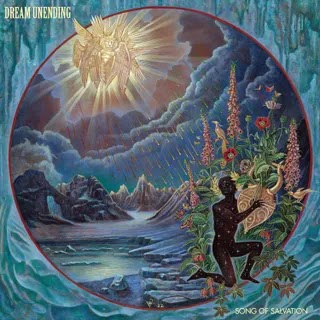Exploding death metal into atmospheric and experimental new dimensions, the dream-doom duo’s monuments to melancholy have never felt so crushing or beautiful.
The guitar riff that introduces “Ecstatic Reign,” the 16-minute closing track on Song of Salvation, is a sad, wispy melody that sounds a little like distant birdsong filtered through a chorus pedal and amplified inside an empty church. When a slow-motion drumbeat enters, drowned in echo that suggests a noirish fog lifting from the cymbals, it also sounds a little like “Lazy,” a 1994 slowcore lament by Low. The landscape slowly fills with distorted guitars, gothic synths, and death-metal growls that sound like a volcano erupting. Within moments, you are fully immersed in the world of Dream Unending, the dream-doom duo whose monuments to melancholy have never felt so crushing or beautiful.
Before Derrick Vella was the guitarist of Dream Unending—or, as the liner notes credit him, the “Architect of Dreams”—we first met him as a member of the Canadian death-metal band Tomb Mold. In the mid-2010s, they emerged as one of several groups carrying the genre to wilder, artsier territory, taking notes from its most eccentric forebears to help shape its future. Across their increasingly ambitious catalog, Tomb Mold crafted songs that felt as likely to explode into pit-ready climaxes as collapse into murky, dead-space ambience. There was a shared sense among their bandmates that death metal—with its vicious tempos, dissonant melodies, and guttural, indecipherable vocals—was a means of channeling complicated, troubled emotions that would otherwise go unprocessed.
In Justin DeTore, the Innumerable Forms frontman who provides drums and vocals (in the credits, “the Bridge Between Two Worlds”), Vella finds a partner to further explore those emotional threads. Without death metal’s unrelenting speed and volume, and free to let the runtime of any given track wander into the double digits, Dream Unending is a place to wallow, wander, and explore. On a more traditional metal album, the horn-accompanied intro to “Secret Grief” (an homage to “Let’s Go Out Tonight” by the Scottish ambient-pop band the Blue Nile) or the downright gorgeous soloing in “Murmur of Voices” (which wouldn’t be out of place on an ECM release) might be relegated to a breath-catching interlude. On Song of Salvation, these are the destinations, glorious and uncharted in contemporary metal.
Where the group’s 2021 debut, Tide Turns Eternal, introduced these textures, Song of Salvation lives inside them and pushes beyond. Vella and DeTore formed the band as a means of experimenting outside their primary projects, and the pair created both albums remotely, in quick succession. Their collaborative process uses distance to its advantage (DeTore tracked his parts in Philly and Boston, while Vella recorded in Hamilton, Ontario). In each song, you can hear how a germ of an idea—take, for example, that opening riff of “Ecstatic Reign”—could unravel into a thousand different shapes given enough time and space and concentration; the songs themselves feel discursive, shapeshifting. The album’s structure—two bookending epics with a suite of three muted compositions in between—creates such a distinct experience that singling out individual tracks seems to be missing the point. This is the type of record you carve out space to listen to in its entirety, putting on your headphones and entering its world.
The cumulative effect is intense and a little dangerous if you are in the wrong mood. It only takes a few minutes before the atmosphere of Song of Salvation becomes clear. In the opening title track, Vella introduces the general tenor: spectral-sounding minor chords, stretched and embellished with deft picking—the sound of peering through a window at a gray-white sky. The song also introduces the average tempo at which DeTore operates: a doomy stutter whose minor variations can feel like sinking into a pit of despair (“Secret Grief”) or rushing into a triumphant gallop (the bracing finale of “Ecstatic Reign”). Because of these subtle shifts, and the record’s exquisite pacing, the music never feels monotonous, despite its deep focus and overwhelming gloom.
Under the heavenly swirl of electric guitars and slow, pounding drums, you can also hear traces of further collaboration, a means of making the band’s emotional palette more expansive. There are passages of spoken word—whispered overdubs in “Murmur of Voices” and a recitation in “Ecstatic Reign”—along with backing vocals from singer-songwriter McKenna Rae and warm, spacey keys provided by Vella’s father. As on Dream Unending’s debut, these touches sometimes lend an aura of new age, never quite tipping into pastiche but present enough to help distinguish the music from their death-doom influences and indicate that they are following no rule book but the one they are writing for themselves. In each moment, you can hear them striving for the light.



0 comments:
Post a Comment